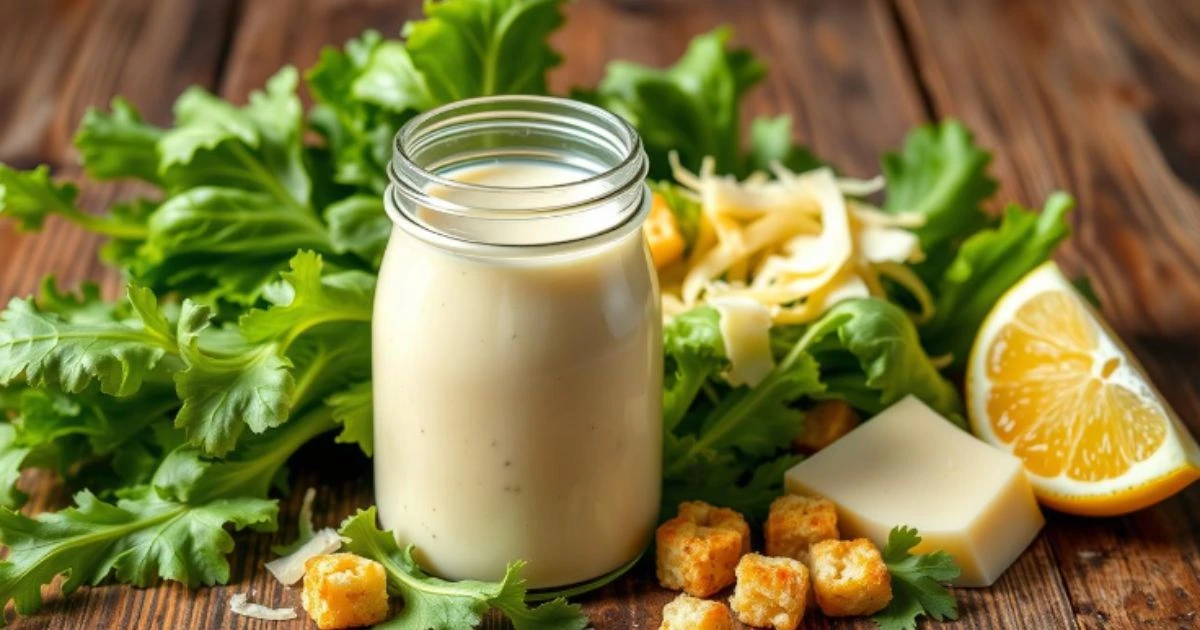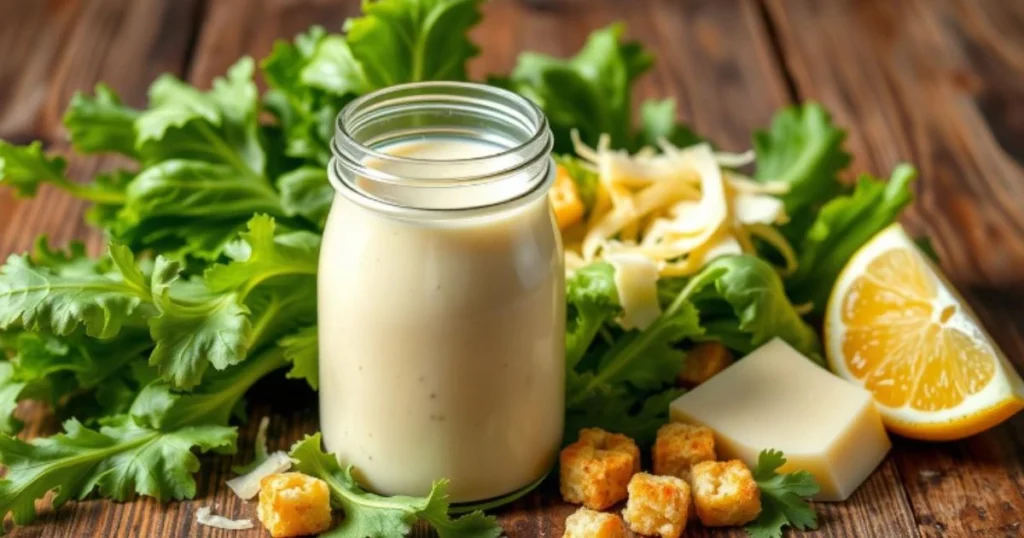Get ready to dive into the rich flavors of a classic caesar salad dressing. It’s a must-have for any salad lover. This creamy dressing is easy to make, perfect for both beginners and seasoned cooks. You’ll soon enjoy a tasty salad with a side of creamy dressing.
At the heart of a great caesar salad is the dressing. Our recipe brings out the best in this beloved condiment. Whether you love traditional this recipe or want to try something new, our guide makes it easy. You’ll learn about essential ingredients and the perfect salad recipe. So, why buy store-bought when you can make your own caesar salad dressing at home?
A creamy Caesar salad dressing in a glass jar, surrounded by fresh romaine lettuce, Parmesan cheese shavings, croutons, and a lemon wedge, with a rustic wooden table background, soft natural lighting highlighting the textures.
Our recipe lets you create a mouth-watering caesar salad that everyone will love. And the best part? It’s super easy to make. You only need a few simple ingredients and basic kitchen tools. If you’re looking for a new salad recipe, our delicious and creamy this recipe is perfect.
Delicious & Creamy Caesar Salad Dressing Recipe
Course: Healthy Eats4
servings10
minutes15
minutes180
kcalhow to make Delicious & Creamy Caesar Salad Dressing Recipe
Ingredients
1 large egg yolk (or 1 tbsp mayonnaise for a no-egg option)
2 tbsp Dijon mustard
2 tbsp fresh lemon juice
2 tbsp red wine vinegar
2 cloves garlic, minced
1 tsp anchovy paste (or 2 anchovy fillets, mashed)
¾ cup olive oil
¼ cup grated Parmesan cheese
Salt and pepper to taste
Directions
- Combine the Base Ingredients: In a bowl, whisk together the egg yolk, Dijon mustard, lemon juice, red wine vinegar, garlic, and anchovy paste.
- Emulsify: Gradually add the olive oil while whisking constantly until the dressing thickens and becomes smooth.
- Add Cheese and Season: Stir in grated Parmesan cheese, and season with salt and pepper to taste.
- Chill and Serve: Let the dressing sit for 10-15 minutes to allow the flavors to meld, then drizzle over your Caesar salad.
Notes
- For a creamier texture, you can add 2-3 tbsp of mayonnaise to the mix.
Adjust anchovy paste to your preference for a stronger or milder flavor.
Store in the fridge for up to 1 week in an airtight container.
A rich, creamy dressing that perfectly complements your Caesar salad! 🥗🧀🍋
Key Takeaways
- Our caesar salad dressing recipe is easy to make and requires just a few ingredients
- The key to a great caesar salad is the quality of the dressing
- With our recipe, you can create a delicious and creamy dressing at home
- Our guide covers everything from ingredients to preparation
- You can customize our recipe to fit your tastes and preferences
- Homemade this recipe is a great alternative to store-bought options
The Rich History Behind Caesar Salad Dressing
The story of Caesar salad is almost a century old. It started in the 1920s with Italian immigrant Caesar Cardini in Tijuana, Mexico. He made a special salad for American tourists that became a hit.
The salad’s core is simple yet elegant. It has romaine lettuce, croutons, and parmesan cheese. Over time, the recipe has changed, but its essence stays the same. The mix of lemon juice and anchovy paste gives it a unique taste.
Origin of Caesar Salad
Cardini himself used to toss the salad tableside. This made the salad even more appealing. It became a favorite in Tijuana, drawing many visitors.
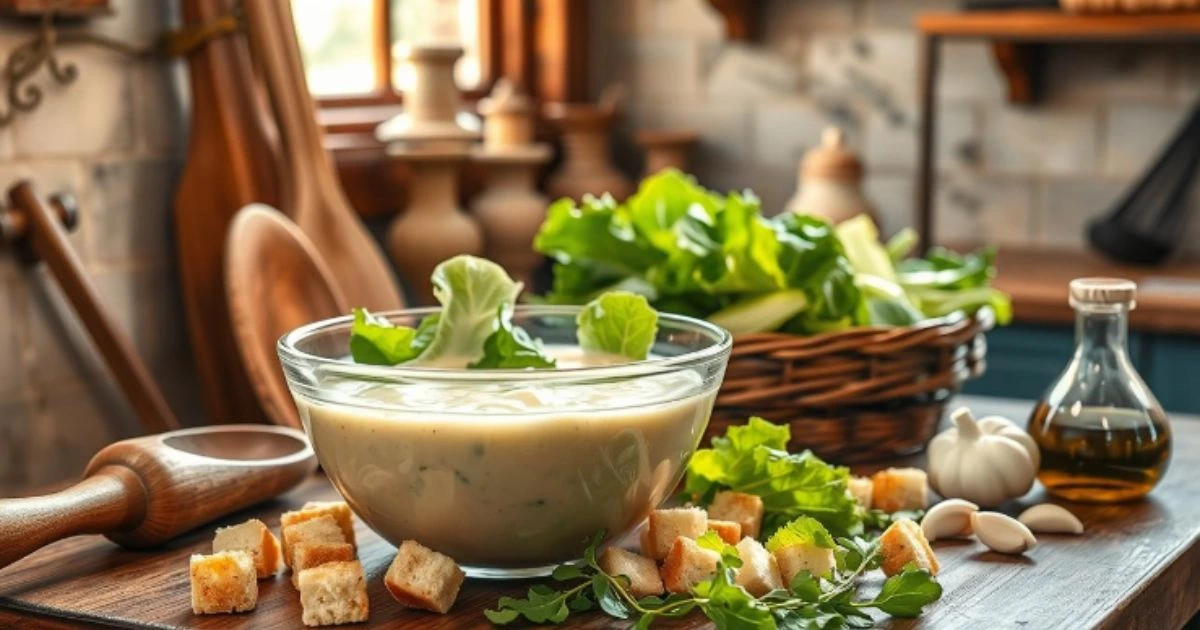
A vintage kitchen scene with rustic wooden utensils, a glass bowl filled with creamy this recipe, fresh romaine lettuce and croutons scattered around, ancient Roman artifacts in the background, olive oil and garlic cloves on a wooden table, warm sunlight streaming through a window.
Evolution of the Classic Recipe
Many factors have influenced the Caesar salad over the years. Yet, its core ingredients have stayed the same. Restaurants worldwide still serve their versions of this classic.
New variations have also emerged. This includes vegan and low-fat options. The salad’s appeal has grown, making it a global favorite.
Why It Became a Global Sensation
The Caesar salad’s fame comes from its versatility. It suits many tastes, whether as a side or main dish. Its unique flavor has made it a staple globally.
The salad’s roots are in Tijuana, but its impact is worldwide. It continues to inspire chefs and food lovers everywhere.
Essential Ingredients for Perfect Caesar Salad Dressing
To make a delicious Caesar salad, you need the right caesar salad ingredients. The dressing is key, and its ingredients can make or break the salad. You’ll need high-quality items like freshly squeezed lemon juice, olive oil, and anchovy paste for the dressing.
A good salad recipe starts with fresh lettuce. For a Caesar salad, use romaine lettuce. Other must-haves include parmesan cheese, garlic, and croutons. Here are some key ingredients for your Caesar salad:
- Fresh romaine lettuce
- High-quality parmesan cheese
- Homemade croutons
- Freshly squeezed lemon juice
- Olive oil
- Anchovy paste
With these caesar salad ingredients and dressing ingredients, you can make a delicious Caesar salad. Choose the best ingredients for your salad recipe to get a tasty and satisfying dish.
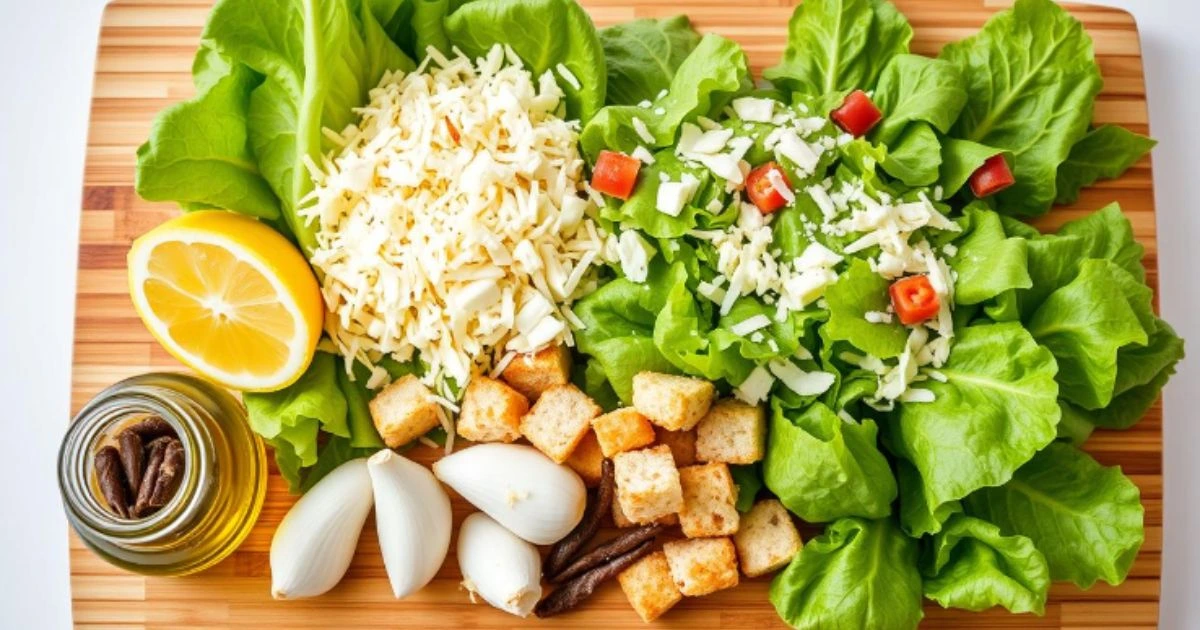
A vibrant arrangement of Caesar salad ingredients, featuring crisp romaine lettuce, freshly grated Parmesan cheese, crunchy croutons, a wedge of lemon, garlic cloves, olive oil in a small glass jar, and anchovies on a wooden cutting board, with a light background to enhance the colors and textures.
Kitchen Tools You’ll Need
To make a tasty Caesar salad dressing, you need the right tools. A good blender or food processor is key. They help mix the dressing smoothly.
You’ll also need a whisk, measuring cups, and a spatula. Sharp knives and a cutting board are useful for chopping garlic and anchovies. These tools make preparing your salad easier.
Essential Equipment
- Blender or food processor
- Utensils (whisk, measuring cups, spatula)
- Sharp knives and cutting board
Optional Tools for Better Results
Some tools can make your this recipe even better. A garlic press makes extracting garlic easy. A salad spinner dries lettuce leaves, making your salad crisp.
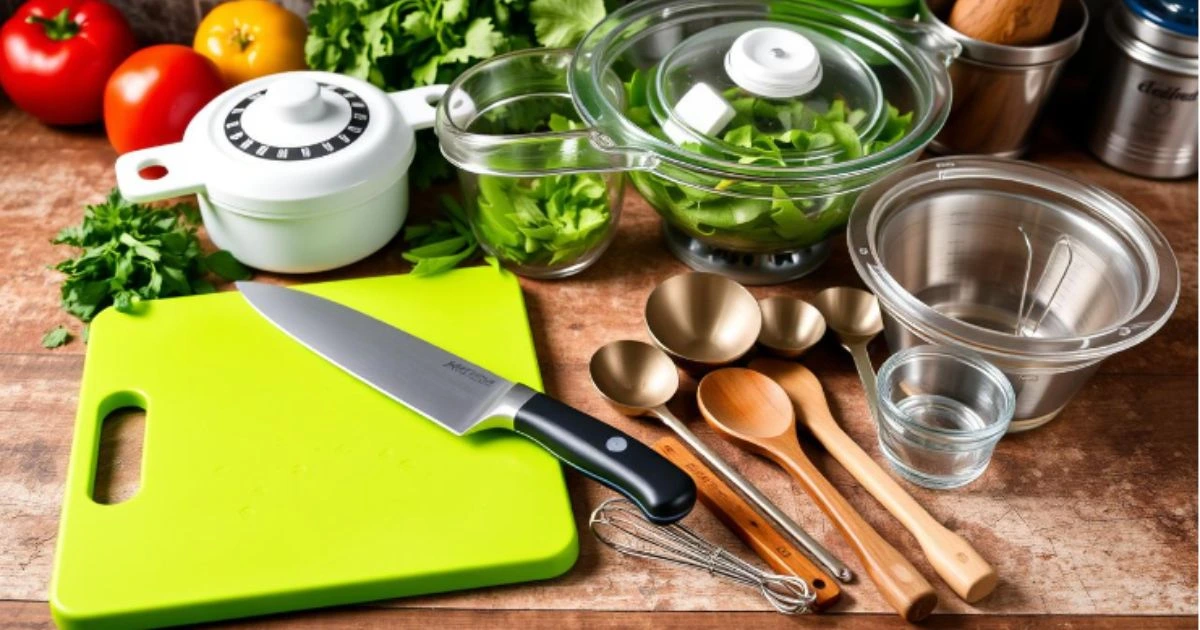
A collection of essential kitchen tools for salad preparation, including a vibrant cutting board, sharp chef’s knife, mixing bowl, salad spinner, measuring spoons and cups, whisk, and a wooden spoon, arranged neatly on a rustic countertop, with fresh vegetables and greens in the background.
Investing in good kitchen tools helps you make a delicious Caesar salad dressing. Choose tools that are durable and make cooking fun.
| Kitchen Tool | Purpose |
|---|---|
| Blender or food processor | Emulsify dressing ingredients |
| Utensils (whisk, measuring cups, spatula) | Mix and measure ingredients |
| Sharp knives and cutting board | Chop ingredients like garlic and anchovies |
How to Make Classic Caesar Salad Dressing
To make a tasty caesar salad recipe, start with a great dressing. High-quality ingredients and the right techniques are key. Gather fresh lemon juice, olive oil, egg, garlic, and anchovy paste.
With all ingredients ready, it’s time to prepare the salad preparation. In a blender or food processor, mix lemon juice, egg, garlic, and anchovy paste. Blend until smooth and well mixed. Slowly add olive oil while blending to make it creamy.
Here are the steps for a perfect dressing recipe:
- Blend the ingredients until smooth
- Slowly pour in the olive oil
- Taste and adjust the seasoning as needed
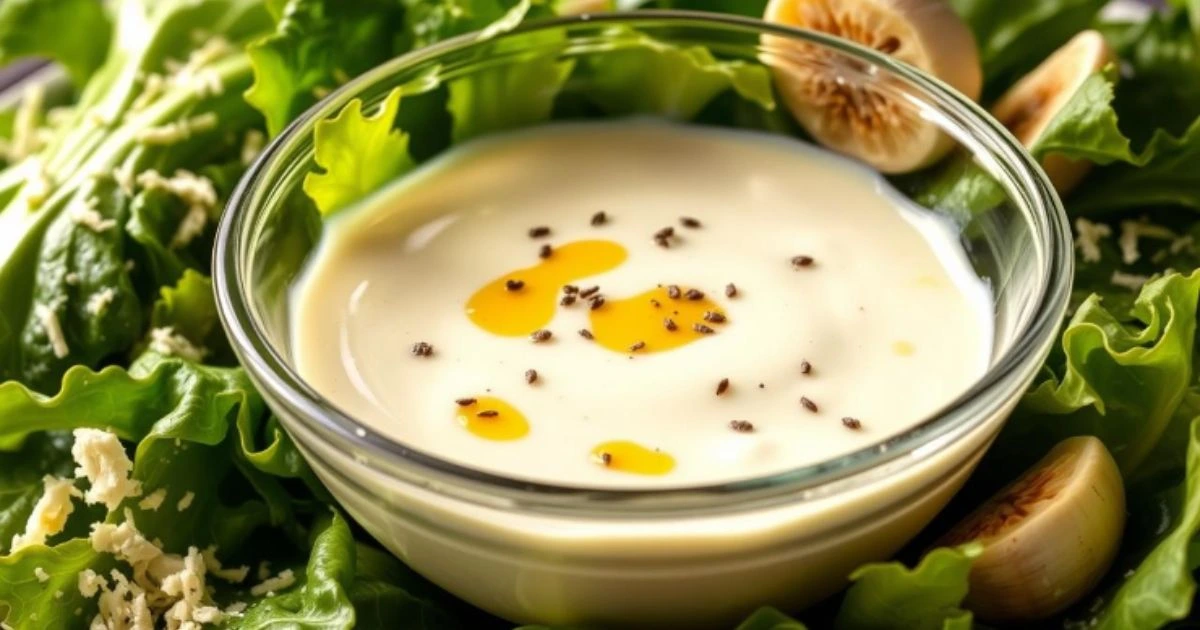
A close-up of a creamy this recipe in a vintage glass bowl, surrounded by fresh romaine lettuce, grated Parmesan cheese, and garlic cloves. The dressing is smooth and thick, with a glossy sheen, drizzled with olive oil and sprinkled with black pepper. Soft natural lighting highlights the textures and colors, creating an appetizing and inviting scene.
By following these steps, you can make a delicious caesar salad recipe. Always use top-notch ingredients and techniques for the best results. With practice, you’ll become a pro at salad preparation in no time.
Tips for Achieving the Perfect Consistency
Getting the right salad dressing consistency is key for a great Caesar salad. You need to know about emulsion techniques and temperature control. Emulsion techniques mix liquids that don’t usually go together, like oil and water. For this recipe, you mix oil, egg, and lemon juice for a smooth texture.
Keeping the right temperature is also key. If it’s too cold, the dressing won’t mix right and might be oily. If it’s too warm, it’ll be too thin. So, it’s best to mix at room temperature.
Common Issues and Solutions
- Separation: If the dressing separates, try whisking it again or adding a little more lemon juice.
- Too thick: If the dressing is too thick, try adding a little more water or lemon juice.
- Too thin: If the dressing is too thin, try adding a little more oil or egg yolk.
By using these tips and techniques, you can get the perfect salad dressing consistency. This will make your Caesar salad a hit with friends and family. Always use fresh ingredients and feel free to tweak the recipe to your liking.
| Ingredient | Quantity | Importance |
|---|---|---|
| Egg yolk | 2-3 | Emulsifier |
| Lemon juice | 2-3 tablespoons | Acidity and flavor |
| Olive oil | 1/2 cup | Flavor and texture |
Nutritional Benefits and Dietary Considerations
Caesar salad dressing can be a good choice for a healthy diet. But, it’s important to think about calories and fat. A typical serving has about 170 calories and 18g of fat.
To make it healthier, try using olive oil and lemon juice instead of usual ingredients. Here are some tips for eating well:
- Choose fresh and organic ingredients whenever you can
- Don’t overdo it with the dressing
- Add healthy stuff like garlic and herbs to balance it out
By paying attention to nutrition and diet, you can enjoy a tasty and healthy Caesar salad dressing. It’s a great part of a balanced diet.
| Nutrient | Amount per serving |
|---|---|
| Calories | 170 |
| Fat | 18g |
| Carbohydrates | 6g |
Modern Variations of Caesar Salad Dressing
Caesar salad has been a favorite for decades. Its popularity has led to many variations. Now, people want healthier and more sustainable options.
Vegan salad options are on the rise. Many brands offer vegan Caesar salad dressing. These are made with plant-based ingredients like tofu and nutritional yeast. They are tasty and meet the demand for vegan and vegetarian choices.
Vegan Alternatives
Vegan Caesar salad dressing uses ingredients like lemon juice and garlic. Some brands make vegan Caesar dressing without animal products. This is great for those who follow a vegan diet.
Low-Fat Options
For a lighter Caesar salad dressing, there are low-fat options. These dressings use less fat but are still full of flavor. They are perfect for those watching their calories.
Anchovy-Free Versions
| Caesar Salad Variation | Description |
|---|---|
| Vegan Caesar Salad | Made with plant-based ingredients, this version is perfect for vegans and vegetarians. |
| Low-Fat Caesar Salad | Made with reduced-fat ingredients, this version is ideal for those watching their calorie intake. |
| Anchovy-Free Caesar Salad | Made without anchovies, this version is perfect for those who do not like the strong flavor of anchovies. |
These modern Caesar salad dressing variations mean everyone can enjoy this classic dish. Whether you prefer vegan, low-fat, or anchovy-free, there’s a version for you.
Storage and Shelf Life Guidelines
Caesar salad dressing
Keeping your Caesar salad dressing fresh is key. The right storage can make your homemade dressing last longer. It’s important to think about food safety, like temperature and handling.
For salad dressing storage, use an airtight container. Keep it away from sunlight and heat. This stops bacteria and keeps it fresh. Always check for spoilage before you eat it, like bad smells or mold.
Proper Storage Methods
To keep your Caesar salad dressing safe and tasty, follow these tips:
- Use a glass jar with a tight lid for storage.
- Keep it in the fridge at 40°F (4°C) or colder.
- Use it within a few days or freeze for up to 3 months.
Signs of Spoilage
Look out for these signs of spoilage in your Caesar salad dressing:
- Bad smell or odor
- Slime or mold growth
- Separation or curdling
By following these guidelines, you can enjoy your homemade Caesar salad dressing safely. Always store it right and check for spoilage to keep it fresh and safe.
| Storage Method | Shelf Life |
|---|---|
| Refrigerator | Up to 1 week |
| Freezer | Up to 3 months |
Pairing Your Caesar Salad Dressing
When it comes to salad pairing, the options are endless. Caesar salad dressing is great with many salads, meals, and ingredients. Try it with romaine lettuce, croutons, and parmesan cheese for a classic taste.
For something different, pair it with grilled chicken, avocado, and cherry tomatoes. This adds a smoky and creamy twist to the salad. You can also mix it with roasted veggies like asparagus and Brussels sprouts for a healthy twist.
Here are some other ideas for salad pairing:
- Spinach and strawberry salad with feta cheese and balsamic glaze
- Grilled chicken and quinoa bowl with roasted vegetables and a citrus vinaigrette
- Kale and pineapple salad with macadamia nuts and a honey-lime dressing
Remember, the key to great dressing pairing is to experiment. Find the perfect balance of flavors and textures. Don’t be afraid to try new food combinations and adjust the seasoning. With a little creativity, you can make a delicious and unique salad that will impress.
Common Mistakes to Avoid
Making Caesar salad dressing can be tricky. It’s easy to make salad mistakes that change the taste and feel of the dressing. Paying close attention to detail and following simple rules is key. Getting the right mix of ingredients is crucial.
To avoid dressing errors, use the right amounts of each ingredient. Start with a basic recipe and tweak it to your liking. This way, you can dodge common mistakes like too much garlic or not enough lemon. By doing this, you’ll make a tasty this recipe.
- Using low-quality ingredients, which can affect the flavor and texture of the dressing
- Not emulsifying the dressing properly, which can result in a separated or oily texture
- Adding too much or too little of a particular ingredient, which can throw off the balance of flavors
Be careful of these common mistakes and follow some cooking tips. This will help you make a delicious Caesar salad dressing. Always taste and adjust as you go. Don’t be afraid to try new things to make the dressing your own.
| Mistake | Solution |
|---|---|
| Too much garlic | Start with a small amount and adjust to taste |
| Not enough lemon juice | Add a squeeze of fresh lemon juice to taste |
| Separation or oiliness | Emulsify the dressing properly by slowly adding oil to the other ingredients |
Making Caesar Salad Dressing in Advance
Preparing salad dressing ahead of time can save you a lot of time. Making this recipe in advance is especially helpful. It lets all the flavors mix well, making the dressing taste richer and creamier.
For meal prep, make a big batch of Caesar salad dressing. Store it in an airtight container in the fridge. This way, you can use it all week for different salads. When you reheat it, whisk it well to keep it smooth and flavorful.
Prep Tips
- Prepare all the ingredients in advance, including freshly squeezed lemon juice and minced garlic.
- Use a blender or food processor to emulsify the dressing, ensuring a smooth and creamy texture.
- Store the dressing in an airtight container, such as a glass jar with a tight-fitting lid.
Reheating Guidelines
To reheat Caesar salad dressing, whisk it well and let it sit at room temperature for about 30 minutes. You can also reheat it in the microwave for a few seconds. But be careful not to overheat it, as this can cause it to separate. By following these guidelines, you can enjoy your homemade Caesar salad dressing all week, making salad prep easy.
| Ingredient | Quantity |
|---|---|
| Lemon juice | 2 tablespoons |
| Garlic | 1 clove |
| Olive oil | 1/2 cup |
Conclusion
As we wrap up our exploration of caesar salad dressing, it’s clear it’s more than a topping. It’s a true culinary art. By knowing the key ingredients and techniques, you can make your salad dressing stand out. This will impress everyone with your homemade version.
Whether you like the classic or a new twist, the most important thing is to have fun. Cooking is all about making it your own. So, get creative, be your own chef, and enjoy the delicious results of your Caesar salad dressing.

